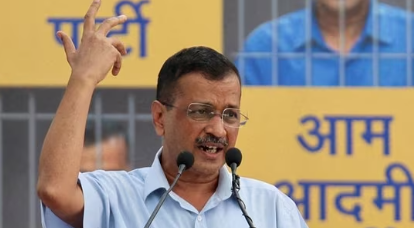Supreme Court Grants Bail to Delhi Chief Minister Arvind Kejriwal: Implications and Legal Context (GS Paper 2, Polity)

Overview of the Case
- Delhi Chief Minister Arvind Kejriwal was granted bail by the Supreme Court of India on September 13, 2024, following nearly six months of incarceration in connection with the alleged Delhi liquor excise policy case.
- This ruling comes after Kejriwal’s arrest by the Central Bureau of Investigation (CBI) in June 2024, which followed an earlier detention by the Enforcement Directorate (ED) related to charges under the Prevention of Money Laundering Act (PMLA).
Supreme Court's Ruling
In a significant decision, the Supreme Court, led by Justice Ujjal Bhuyan and Justice Surya Kant, ruled in favor of granting bail to Kejriwal. The court's judgment was based on several key considerations:
- Prolonged Detention: The court emphasized that Kejriwal’s extended detention without trial amounted to an unjust deprivation of liberty. This decision aligns with the broader principle that detention should be exceptional rather than routine.
- Restrictions Imposed: While granting bail, the court imposed specific restrictions on Kejriwal:
- He is prohibited from accessing his office at the Delhi Secretariat or signing any official documents without the consent of Lieutenant Governor VK Saxena.
- He is also barred from making public statements regarding the merits of the case.
Justice Bhuyan, in his comments, noted that the timing of Kejriwal’s CBI arrest seemed strategically aimed at obstructing his release from the ED case. This observation highlights concerns about the political motivations behind legal actions.
Legal Framework and PMLA
The Prevention of Money Laundering Act (PMLA) plays a central role in this case. Enacted to combat money laundering, the PMLA sets out stringent conditions for granting bail:
- Section 45 of PMLA: This section requires the court to consider whether the Public Prosecutor has had the opportunity to oppose the bail application. Furthermore, the court must be convinced that there are reasonable grounds to believe the accused is not guilty and that they are not likely to commit further offenses while on bail.
- High Threshold for Bail: The conditions under Section 45 reflect the serious nature of money laundering offenses, which are often linked to organized crime and significant financial wrongdoing. The stringent criteria for bail under PMLA are designed to prevent the accused from evading justice or continuing illegal activities.
Supreme Court’s Interpretation
- The Supreme Court’s decision in this case reaffirms the principle that bail should be the norm and incarceration the exception.
- In the context of the PMLA, this principle means that even when stringent conditions are imposed, they must be applied in a way that respects the fundamental right to personal liberty under Article 21 of the Indian Constitution.
- In earlier cases such as Prem Prakash v. Union of India, the Supreme Court held that while PMLA imposes specific bail conditions, these do not override the constitutional guarantee of liberty.
- The Court emphasized that deprivation of liberty should be justified and not indefinite.
Political and Social Reactions
The Supreme Court’s decision has elicited a range of responses:
- Supporters of Arvind Kejriwal: They view the bail as a significant victory against what they perceive as politically motivated persecution. The Aam Aadmi Party (AAP) celebrated the ruling, arguing that the prolonged detention of its leader was an attempt to stifle political dissent and interfere with electoral processes.
- Critics and Opposition: Some critics argue that the case and subsequent legal maneuvers are indicative of broader issues within the Indian legal and political systems. They contend that high-profile cases are often subject to political pressures and that the timing of legal actions can be strategically motivated.
Broader Implications
The case has broader implications for Indian politics and legal practices:
- Legal Precedents: The decision reinforces the principle that detention without trial is contrary to constitutional guarantees of personal liberty. It sets a precedent for handling cases involving high-profile individuals and ensures that legal processes are not unduly influenced by political considerations.
- Political Dynamics: The case highlights the interplay between legal systems and political strategies in India. As electoral politics often intersect with legal battles, the outcomes of such cases can have significant ramifications for political stability and public perception.
Conclusion
- The Supreme Court's ruling in favor of granting bail to Arvind Kejriwal marks a pivotal moment in the ongoing legal and political saga surrounding the Delhi liquor excise policy case.
- By underscoring the principles of timely justice and personal liberty, the Court’s decision reinforces the rule of law in India, even amidst high-stakes political controversies.
- As the case continues to unfold, it will likely remain a focal point in discussions about legal integrity and political accountability in the country.


